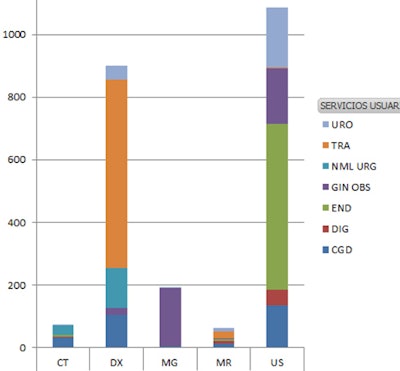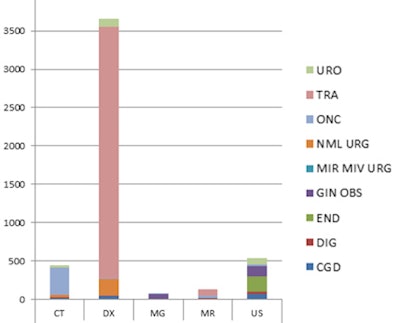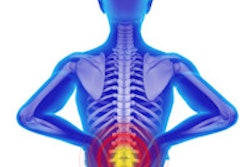
Clinicians occasionally order unnecessary imaging studies simply because they're unaware that their patients had recently received the exam. Spanish researchers have found this problem can be reduced by software that alerts referring physicians when they are ordering a potential repeat study.
After implementing their software tool, researchers from the Hospital del Henares in Madrid, Spain, found more than 5% of imaging studies ordered over the next year generated an alert notifying the ordering physician their request had been previously performed on the patient within the last 180 days. After viewing the alert, the ordering providers elected not to proceed with more than one-third of the initial requests, according to Dr. Patricia Fraga Rivas.
"It is useful to have a tool in our clinical decision-support system to control repeated requests [for imaging studies conducted over] a short period of time," said Rivas, who presented the institution's experience during a scientific session at ECR 2018 in Vienna.
Many unnecessary tests
One of the main problems facing radiology departments today is the large volume of unnecessary imaging studies performed on patients. These repeat exams can negatively affect patients by causing them anxiety as they wait for the results of a second test, or even result in a delayed main diagnosis due to the detection of nonsignificant findings, Rivas said. What's more, it can increase healthcare spending, lengthen waiting lists, and -- depending on the imaging modality -- deliver additional radiation dose to patients.
"A high number of unnecessary [imaging studies] correspond to tests already done recently and [are] repeated due to the ignorance of the physician of the existence of the previous [test]," she said.
 Distribution of services that reject the second test and by modality. SERVICIOS USUAR: referring physician departments,
Distribution of services that reject the second test and by modality. SERVICIOS USUAR: referring physician departments,URO: urology, TRA: traumatology, NML URG: pneumology, GIN OBS: gynecology and obstetrics, END: endocrinology, DIG: gastroenterology, CGD: general surgery. All figures courtesy of Dr. Patricia Fraga Rivas.
 Services that consider the repetition necessary and by modality. Uro: urology, TRA: traumatology, ONC: oncology, NML: pneumology, MIR: internal medicine, GIN: gynecology, END: endocrinology, DIG: gastroenterology, CGD: general surgery.
Services that consider the repetition necessary and by modality. Uro: urology, TRA: traumatology, ONC: oncology, NML: pneumology, MIR: internal medicine, GIN: gynecology, END: endocrinology, DIG: gastroenterology, CGD: general surgery.To address this challenge, the Hospital del Henares implemented a software tool in November 2016 that provides warnings in the event of a request for a possible repeat imaging study. Incorporated into the institution's electronic medical record software and clinical decision-support system, the application alerts physicians if they order an imaging study that will repeat an exam that had been performed within the previous 180 days. The clinicians then decide whether to proceed with their request.
The researchers then analyzed the effectiveness of the software tool at their institution, which has one MRI system, one CT scanner, one mammography system, four ultrasound systems, and four conventional radiography systems. Between November 2016 and December 2017, the hospital received 186,113 requests for radiological tests.
Of these 186,113 requests, 9,720 (5.2%) triggered alerts warning that a prior study had been performed within the previous 180 days. On a modality basis, radiography (54.7%) and ultrasound (23.8%) made up most of the requests that triggered a repeat-study alert:
- Radiography: 5,315 orders for repeat studies
- Ultrasound: 2,313 orders for repeat studies
- CT: 978 orders for repeat studies
- Mammography: 342 orders for repeat studies
- MRI: 336 orders for repeat studies
- Radiography/fluoroscopy: 37 orders for repeat studies
Avoiding repeat studies
The ordering physician elected to go ahead with the order in 6,222 (64%) of the requests but canceled the request in the remaining 3,498 (36%) orders, according to Rivas. CT and radiography were the most likely studies to be performed anyway despite the alert.
| Ordering physician decisions after receiving repeat-study alert | |||||
| CT | Radiography | Mammography | MRI | Ultrasound | |
| Completed order | 709 (72.5%) | 4,031 | 95 | 221 | 27 |
| Canceled order | 269 (27.5%) | 1,284 | 247 | 115 | 1,399 |
Delving further into the results, the researchers found the traumatology service (for radiography) was the department that most frequently elected to avoid the repeat study, followed by the endocrinology department (for ultrasound studies).
"Logically ... the simple radiographs have also been repeated [by the traumatology service] in a great number of patients in a small time interval, followed in number by the CT scans performed in oncology patients," Rivas said.



















